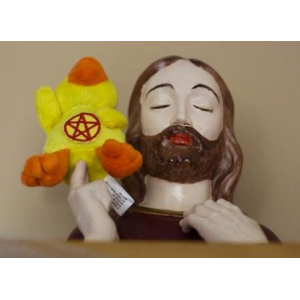
The core difficulty -- beliefs in deity:
Merging the conflicting beliefs about deity found in two religions is often the main problem area in creating a syncretistic religion:
* Christian beliefs: Most contemporary Christians regard themselves as monotheists even as many Muslims and Jews regard Christians as polytheists. Christians believe in the Trinity: one deity composed of three persons: the Father God, his Son Jesus, and the Holy Spirit.
The Bible, literally interpreted, describes "Wisdom" as a type of female Goddess who was also present at the creation of the universe. However, although she appears in many locations of the Bible, she does not play a significant role in most modern Christian faith groups.
* Wiccan belief: Wiccans believe in a duo theistic deity structure: a Goddess and a God. Further, the Goddess is viewed as having three aspects: Maiden, Mother and Crone, representing sexuality, fertility and wisdom.
At first glance, the beliefs of Wicca and Christianity concerning deity appear to be hopelessly in conflict. But some Wiccans have been able to harmonize Christian and Wiccan elements into a concept of a single deity or godhead with multiple aspects.
Other problems -- particularly among conservative Protestants:
Most Conservative Christians reject the concept that a Wiccan can be a Christian. 1 Some of the problem areas are:
* As noted in this section's menu under "quotes," many Christians believe that the Bible condemns Witchcraft. However, the practices that biblical passages -- in the original Hebrew and Greek -- condemn are actually:
o Females engaged in evil forms of sorcery that harm or kill people and/or animals, and
o Murderers who kill people through the use of poison.
Both practices are forbidden to Wiccans who are required by their Wiccan Rede to do no harm. Unfortunately, the terms "Witch" and "Witchcraft" have at least 18 different meanings. Some refer to evil harmful elements; others to a gentle, earth-based
spiritual path. There is no general consensus of the meaning of the term "Witch" or "Witchcraft."
* Many conservative Christians define a Christian quite specifically. They include only an individual who has repented of their sins, trusted Jesus as their Lord and Savior, and accepted certain core traditional Christian teachings. (e.g. the Trinity, Incarnation, resurrection of Jesus, virgin birth, heaven, hell, sin, salvation, original sin, the existence of Satan as a living entity, etc.) Many of these teachings are incompatible with Wiccan theology.
* Many conservative Christian denominations teach that women should not be in a position of power over a man, either in church, at work, or at home. Such a belief is totally at variance with Wiccan beliefs who generally believe in sexual equality and equal roles for males, females and intersexuals.
* Many, probably most, conservatives from a wide range of religions believe that homosexuality is an unnatural, abnormal, chosen, changeable and intrinsically sinful behavior no matter what the couple's
relationship.
Most Wiccans disagree with these beliefs, and accept the findings of human sexuality researchers that a homosexual orientation is normal and natural for a minority of adults. Further, researchers have found that a sexual orientation is not chosen and - for almost all or all adults -- cannot be changed. Some regard a sexual practice as sinful if only it is unsafe, manipulative, coercive, or against a persons basic sexual orientation -- whether they have a heterosexual, homosexual or bisexual orientation.
* Many conservative Christians believe that various forms of divination are an integral part of Wicca. Since the Bible contains passages condemning many of the divination techniques which were in use in ancient times, they conclude that there is no room for Wiccan belief within Christianity.
They overlook that some forms of divination were condoned by the Bible. One was even used by temple priests. Also, while it is true that some Wiccans engage in divination, not all do. Divination is not part of the core theology of Wicca.
* Wiccans would have to abandon many traditional biblical teachings in order to consider themselves to be Christian. However, millions of Americans already reject major portions of the Bible, and still regard themselves as Christians. For example, progressive Christians generally reject certain themes and stories in the Bible as being profoundly immoral and not representing the Will of God. These might include: genocide, human slavery, transferring guilt and punishment from the guilty to the innocent, burning some hookers alive, whipping children with a rod, raping female prisoners of war, execution of non-virgin brides, executing people who work on the Sabbath, executing sexually active persons with a homosexual orientation, executing religious minorities, etc.
It is clear that a person cannot develop a synchronistic religion out of elements of Wicca and Christianity without first rejecting much of the content of the Bible and many
historical Christian beliefs. This would exclude them from the conservative Christian fold in the same way that liberal Christians are considered to be non-Christian or sub-Christian by many religious conservatives.
A positive note: liberal Christians may accept a Christian/Wiccan syncretistic religion:
Among progressive Christians, the term Christian has generally been defined much more broadly. For example, some believers might accept as a Christian any person who holds Jesus in reverence, views him as the greatest of prophets, and tries to follow his teachings. Many Wiccans, other Neopagans, Humanists, Unitarian Universalists are able to harmonize their beliefs and practices with this definition.
Downloadable books (free):
Adolph Von Menzel - Historical And Literary Studies Pagan Jewish And Christian
Gordon Ireland - Faq On Wicca And Witchcraft And More
George Gifford - A Dialogue Concerning Witches And Witchcraftes
Al Selden Leif - 6 Questions On Wicca And Paganism



